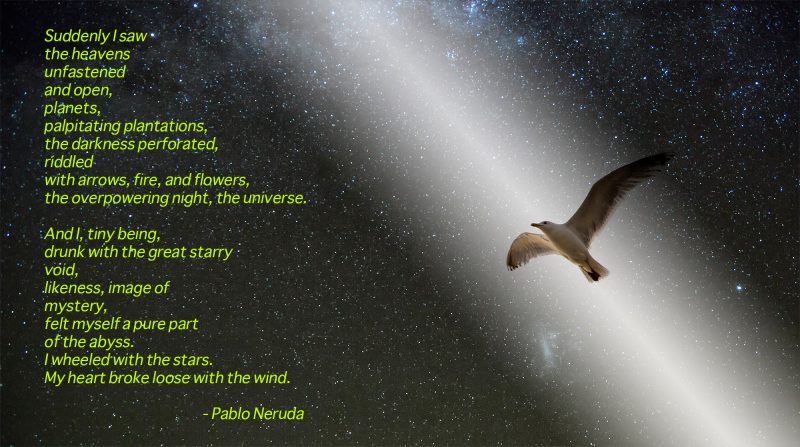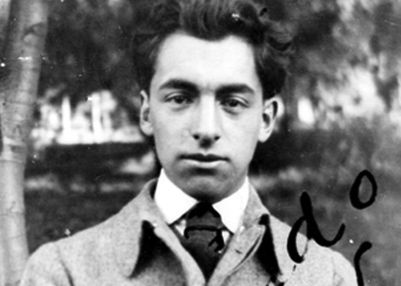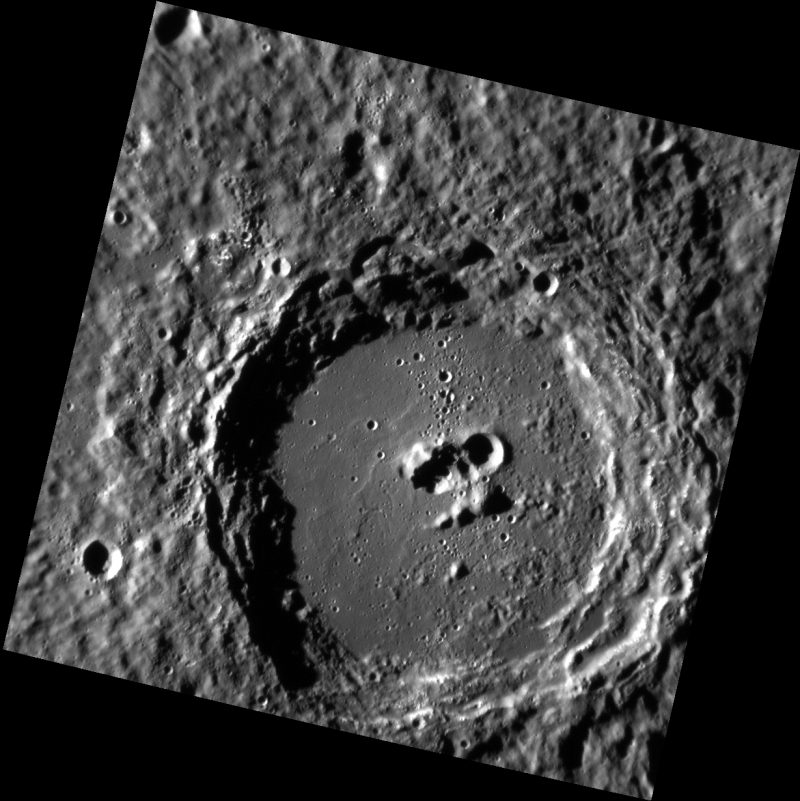
Playing with the light of the universe
The great Chilean poet Pablo Neruda (1904-1973) died on this date – September 23 – in 1973. He was born in 1904. Astronomer Michael West of Lowell Observatory shared an image with us, a photo he took, that he’d inscribed with Neruda’s words. He wrote:
Astronomical imagery often figured in Neruda’s poetry, for example, one of his poems begins: Every day you play with the light of the universe.
Another poem titled The Future is Space describes black space with room for many dreams.
In the attached composite image (made from photos I took in Chile) I’ve included a portion of Neruda’s poem titled La Poesia in which the Nobel Prize winner described the feeling of discovering poetry as a youth, comparing it to the beauty of the universe.
… As you know, Neruda’s homeland of Chile, which he loved, is now home to many of the world’s greatest telescopes, including the future European Southern Observatory Extremely Large Telescope (ELT) and the Giant Magellan Telescope (GMT).
Original photo taken with a Canon 5D MkIII.
Post-processing via Photoshop CC + Nik plug-ins.
Thank you for sharing your image with Neruda’s words, Michael!
Pablo Neruda’s life

Pablo Neruda was born Ricardo Eliécer Neftalí Reyes Basoalto on July 12, 1904. He was a poet-diplomat and politician who won the Nobel Prize for Literature in 1971. He began writing poems at the age of 13. The space imagery in his poems inspired scientists to name a crater on Mercury in his honor. The Neruda Crater is 70 miles (112 km) across.
The Johns Hopkins Applied Physics Laboratory website describes the Neruda Crater as follows:
The crater exhibits several central peaks punctuated by a more recent, small crater, resulting in a rugged profile of ups and downs if one were to traverse the crater floor. Similarly, the crater’s namesake Neruda experienced a number of ups and downs in his life, from success as a poet, through poverty, war and ultimately alleged poisoning.
An exhumation and studies of Neruda’s remains from 2013 to 2017 found that Neruda had prostate cancer and may have had a staph infection at the time of his death. His manner of death is listed as a heart attack, and foul play has never been proven.

Bottom line: On September 23, 1973, the great Chilean poet, Pablo Neruda, passed away. Today we honor his connection to astronomy.
The post Pablo Neruda, a poet who embraced cosmic beauty first appeared on EarthSky.
from EarthSky https://ift.tt/3zDpN5Q

Playing with the light of the universe
The great Chilean poet Pablo Neruda (1904-1973) died on this date – September 23 – in 1973. He was born in 1904. Astronomer Michael West of Lowell Observatory shared an image with us, a photo he took, that he’d inscribed with Neruda’s words. He wrote:
Astronomical imagery often figured in Neruda’s poetry, for example, one of his poems begins: Every day you play with the light of the universe.
Another poem titled The Future is Space describes black space with room for many dreams.
In the attached composite image (made from photos I took in Chile) I’ve included a portion of Neruda’s poem titled La Poesia in which the Nobel Prize winner described the feeling of discovering poetry as a youth, comparing it to the beauty of the universe.
… As you know, Neruda’s homeland of Chile, which he loved, is now home to many of the world’s greatest telescopes, including the future European Southern Observatory Extremely Large Telescope (ELT) and the Giant Magellan Telescope (GMT).
Original photo taken with a Canon 5D MkIII.
Post-processing via Photoshop CC + Nik plug-ins.
Thank you for sharing your image with Neruda’s words, Michael!
Pablo Neruda’s life

Pablo Neruda was born Ricardo Eliécer Neftalí Reyes Basoalto on July 12, 1904. He was a poet-diplomat and politician who won the Nobel Prize for Literature in 1971. He began writing poems at the age of 13. The space imagery in his poems inspired scientists to name a crater on Mercury in his honor. The Neruda Crater is 70 miles (112 km) across.
The Johns Hopkins Applied Physics Laboratory website describes the Neruda Crater as follows:
The crater exhibits several central peaks punctuated by a more recent, small crater, resulting in a rugged profile of ups and downs if one were to traverse the crater floor. Similarly, the crater’s namesake Neruda experienced a number of ups and downs in his life, from success as a poet, through poverty, war and ultimately alleged poisoning.
An exhumation and studies of Neruda’s remains from 2013 to 2017 found that Neruda had prostate cancer and may have had a staph infection at the time of his death. His manner of death is listed as a heart attack, and foul play has never been proven.

Bottom line: On September 23, 1973, the great Chilean poet, Pablo Neruda, passed away. Today we honor his connection to astronomy.
The post Pablo Neruda, a poet who embraced cosmic beauty first appeared on EarthSky.
from EarthSky https://ift.tt/3zDpN5Q

Aucun commentaire:
Enregistrer un commentaire